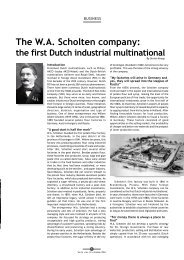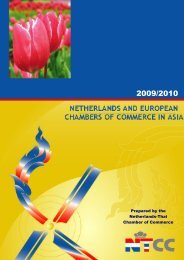August 2005 - Association of Dutch Businessmen
August 2005 - Association of Dutch Businessmen
August 2005 - Association of Dutch Businessmen
Create successful ePaper yourself
Turn your PDF publications into a flip-book with our unique Google optimized e-Paper software.
REVIEW<br />
Myths and facts about medicine<br />
Review <strong>of</strong> presentation <strong>of</strong> Taco van Tiel at the Hollandse Club at 17 May <strong>2005</strong><br />
By Debby Reemers<br />
Why would an increased risk in getting breast<br />
cancer by 30% for a certain medicine not be a<br />
reason to stop producing it? The questions from<br />
the audience for Taco van Tiel are not at all the<br />
easiest to answer. By nature the pharmaceutical<br />
industry has always been surrounded by<br />
controversy. A company making its pr<strong>of</strong>it on<br />
supplying expensive medicine to sick people: the<br />
topic will always remain a highly intricate and<br />
tricky one. Still though, Taco van Tiel regional<br />
marketing and sales manager at Organon, not only<br />
managed to show us an in-depth view from the<br />
industry point <strong>of</strong> view he also presented a lot <strong>of</strong><br />
interesting research results and other related issues<br />
on the pharmaceutical industry to an interested<br />
and critical audience at the Hollandse Club.<br />
Van Tiel concentrated on three main subjects<br />
to address the broad topic <strong>of</strong> ‘Myths and Facts<br />
about Medicine’<br />
- The perception versus reality <strong>of</strong> doing business<br />
in the pharmaceutical industry;<br />
- How does Singapore (Asia) differ from Western<br />
Europe and the USA;<br />
- Building brands in the pharmaceutical arena.<br />
This article will highlight the first and second<br />
topic as these were more elaborately discussed.<br />
Perception versus reality<br />
Pharma companies will market drugs despite the<br />
fact they know they are potentially harmful. Most<br />
drugs are dangerous, you can read it in the papers<br />
every day! According to Van Tiel, this is the most<br />
common misunderstanding that people have on how<br />
companies like Organon operate. He explains about<br />
the extensive research procedure a drug has to go<br />
through before it even gets to the FDA for final<br />
approval. From an independent study in 2003 by<br />
Drug Discovery Today (December 2003) on several<br />
leading pharma companies it was concluded that<br />
on average only 1.2 out <strong>of</strong> 57 projects that result<br />
from a ‘discovery’ would make it through the drug<br />
registration phase by the drug regulating authority,<br />
after which only 1 project on average actually<br />
gets launched. In fact, during the internal clinical<br />
trials 90% <strong>of</strong> all research projects are already<br />
stopped during the first (out <strong>of</strong> the total <strong>of</strong> 4)<br />
clinical development phase. The quality <strong>of</strong> research<br />
projects in the U.S.A., the most important market<br />
for Organon, is continuously monitored by the<br />
independent U.S. Data and Safety Monitoring<br />
Board. If a project does not adhere to their<br />
standards, the research project is stopped. Van Tiel<br />
adds, that Organon is one <strong>of</strong> the few pharmaceutical<br />
companies that continues testing its products after<br />
the launch, unlike its main competitors.<br />
The controversy <strong>of</strong> certain medicine and the<br />
way media reports on them is illustrated by a drug<br />
used in Hormone replacement therapies (HRT) with<br />
the name <strong>of</strong> Tibolone. This HRT drug helps women<br />
to s<strong>of</strong>ten the symptoms <strong>of</strong> the menopause which<br />
includes hot flushes and night sweats. The drug<br />
also helps to strengthen the bones. Media reported<br />
headlines such as ‘600,000 women warned to stop<br />
taking combined HRT medicines’, therewith<br />
inciting what Van Tiel calls a ‘hormonophobia’.<br />
These headlines were based on a global study called<br />
‘Million Women Study’ (MWS), as published by the<br />
British medical journal ‘The Lancet’ in March <strong>2005</strong>.<br />
The MWS claimed a 30% increase in the risk for<br />
breast cancer when using HRT. Van Tiel explains<br />
why the results from this study are not fully valid.<br />
The study is a so called observational study, as<br />
opposed to a clinical trial. Observational studies<br />
do not make use <strong>of</strong> placebos (i.e. sugar pills with<br />
no active ingredients) which means they lack<br />
control groups. As a result you will not know how<br />
many <strong>of</strong> participants would have gotten cancer<br />
while using a placebo in stead <strong>of</strong> the tested drug.<br />
The lack <strong>of</strong> a controlled environment also causes<br />
other research problems. In the case <strong>of</strong> the MWS,<br />
several women stopped using the drug during the<br />
trial, took the drug on an irregular basis, or even<br />
switched drugs. In addition, the MWS test group<br />
was already seeing the General Practitioner (GP)<br />
for particular hormone related symptoms. Possibly<br />
this group <strong>of</strong> women is anyhow running a higher<br />
risk on developing breast cancer than a randomized<br />
group <strong>of</strong> women. Therefore such group cannot<br />
be considered representative for the general<br />
population <strong>of</strong> the UK. Several national authorities<br />
have publicly questioned the results <strong>of</strong> the MWS<br />
based on the above mentioned limitations. Still<br />
though, the media seem to take these studies out<br />
<strong>of</strong> their contexts and turn these into unsubstantiated<br />
headlines. A possible negative effect resulting<br />
from this could be that potential beneficiaries<br />
from medicine will not make use <strong>of</strong> HRT and<br />
other ‘demonized’ medicines. There are also other<br />
4<br />
Vol.15 • No. 6 • July/<strong>August</strong> <strong>2005</strong>
















